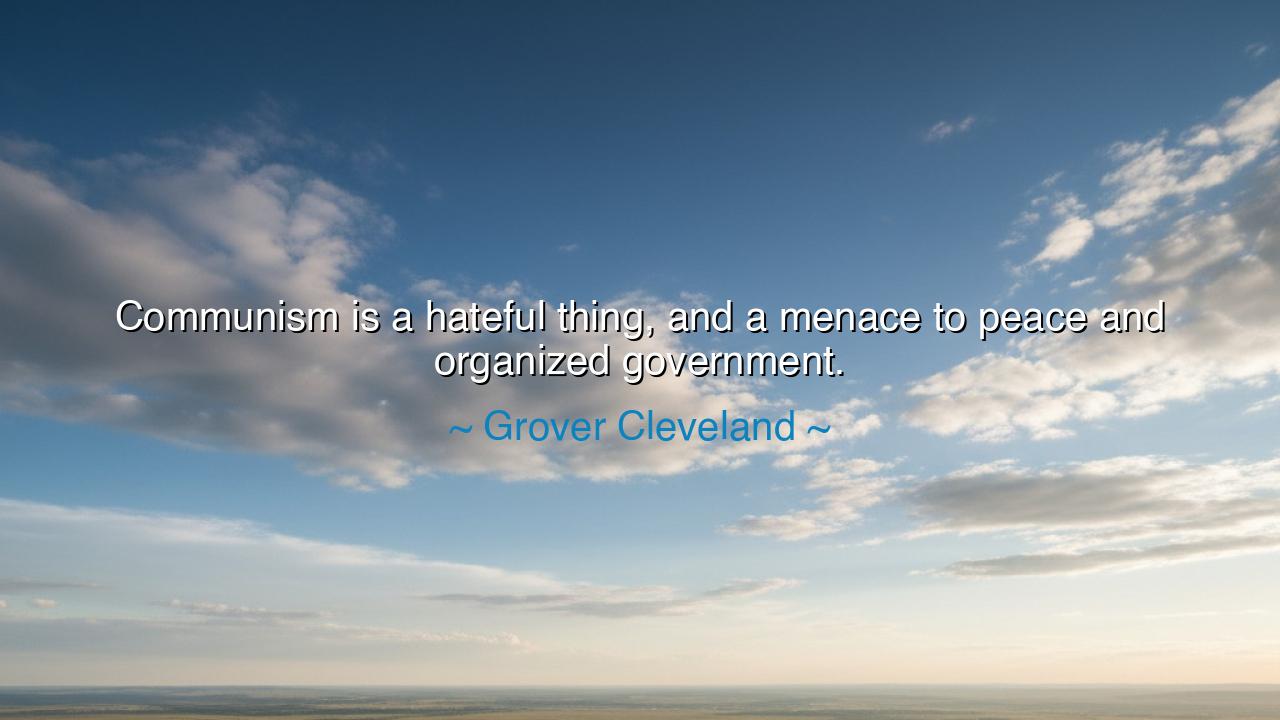
Communism is a hateful thing, and a menace to peace and organized






"Communism is a hateful thing, and a menace to peace and organized government." – Grover Cleveland
In these grave and resolute words, Grover Cleveland, the 22nd and 24th President of the United States, spoke not only as a statesman but as a guardian of the fragile order that holds civilization together. His statement—“Communism is a hateful thing”—was not born of malice, but of moral conviction and historical foresight. He perceived in the ideology of communism not merely an economic theory, but a spiritual danger: a force that seeks to overturn the moral foundation of society in the name of equality, yet often brings ruin, violence, and tyranny in its wake. His warning resounds across the centuries as a defense of peace, order, and moral responsibility—the pillars upon which every just government must stand.
The origin of this quote lies in the turbulent political climate of the late 19th century, when class unrest and labor radicalism were beginning to rise in industrial nations. Cleveland, a man of law and restraint, viewed communism and its close ally, anarchism, as threats not only to property but to the moral structure that allowed liberty to exist. He saw in them the seeds of chaos—movements that promised heaven but delivered bloodshed. His words were a response to the violent uprisings of his time, such as the Haymarket Riot of 1886, which left the streets of Chicago stained with the blood of both workers and police. In that event, noble demands for justice were hijacked by the fanatical call for destruction. To Cleveland, this was the essence of the communist impulse: a hatred disguised as hope, a philosophy that exalts envy over effort and rebellion over reason.
When Cleveland called communism “a menace to peace and organized government,” he spoke of something deeper than politics. He spoke of the eternal struggle between order and anarchy, between creation and destruction. For peace is not the absence of conflict—it is the harmony of free souls bound by law and shared purpose. And government, when truly organized, is not an engine of oppression but a framework through which human dignity may flourish. Communism, in his eyes, sought to abolish both—claiming to liberate man by destroying the very institutions that preserve his freedom.
History has confirmed the truth of his warning. When the Bolshevik Revolution of 1917 transformed Russia into the Soviet Union, the world saw the rise of a regime that promised equality and delivered oppression. The red banners that fluttered in the name of the worker soon became veils for tyranny. Millions were starved, silenced, or slaughtered—not by external enemies, but by their own government in the pursuit of ideological purity. Similar tragedies unfolded in Maoist China, Cambodia under Pol Pot, and elsewhere, where dreams of utopia became nightmares of blood. The promised classless paradise turned out to be an empire of fear. Cleveland’s words, once dismissed as old-fashioned caution, became prophetic—a voice from an earlier century foretelling the agonies of the next.
Yet his condemnation was not of compassion itself. Cleveland, a man of conscience, never denied the plight of the poor or the duty of society to uplift the weak. But he understood that true justice cannot grow from hatred. The moment reform turns to revenge, the spirit of civilization begins to die. Communism, as he saw it, transforms moral concern into moral violence—claiming to love humanity while despising individuals. It preaches equality, yet builds its temples upon fear. The lesson of history confirms his insight: that peace cannot be achieved through destruction, nor virtue through coercion.
In the style of the ancients, let us read Cleveland’s warning as more than politics—it is a moral law. The same poison that once tore nations apart still lingers wherever envy eclipses gratitude, wherever the cry for equality becomes the cry for domination. For government, to remain just, must balance mercy with order, compassion with truth. The hatred that animates extremism—whether red, black, or any color—can never lead to peace. Like a fire fed by its own ashes, it consumes what it claims to save.
The lesson, then, is not to abandon the pursuit of justice, but to pursue it rightly. Reform, but do not destroy. Criticize, but do not hate. Build upon love, not upon envy. Every citizen must guard within himself the balance that Cleveland sought to preserve in his nation—the harmony of freedom and responsibility. For the health of any government depends not only on the virtue of its leaders, but on the self-discipline and gratitude of its people.
And so, the practical actions are these: cherish peace, but understand that peace is built on principle. Uphold government not as a tyrant to be feared, but as a covenant to be honored. When you see injustice, work to mend it—not through rage or destruction, but through moral strength and civic wisdom. For as Grover Cleveland taught, the greatest threat to organized government is not merely the gun or the mob—it is the corrosion of the heart that forgets that freedom, order, and virtue must walk hand in hand. And when these three stand together, no hateful doctrine can overthrow the light of civilization.






AAdministratorAdministrator
Welcome, honored guests. Please leave a comment, we will respond soon